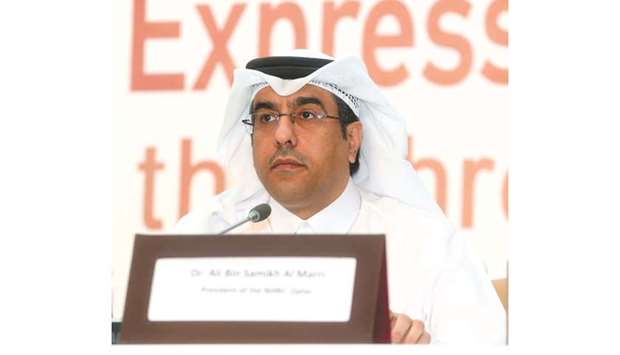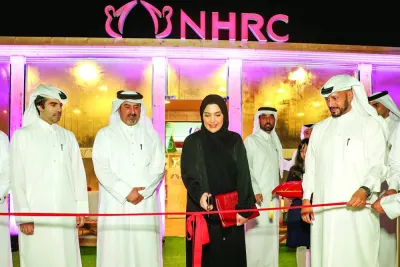The participation of more than 200 international rights groups, press syndicates, think-tanks and universities is clear evidence of the support for Qatar against any demands or calls to restrict freedom of opinion and expression and the harassment and targeting of journalists, the National Human Rights Committee (NHRC) chairman has stressed.
Dr Ali bin Smaikh al-Marri was speaking at the international conference on threats facing the freedom of expression, which opened yesterday in Doha.
The conference is taking place over two days in co-operation with the International Federation of Journalists (IFJ), International Press Institute (IPI) and with support from the Office of the United Nations High Commissioner for Human Rights (OHCHR), European Broadcasting Union (EBU) and Human Rights Watch.
Dr al-Marri noted that the siege countries have manipulated the lives of thousands of people, disrupted family reunification, deprived children of their parents, undermined the social fabric of Gulf communities, damaged the income sources of many employees and workers, and destroyed the future of students by expelling them from universities and disrupted their education.
The siege countries also punished their citizens for expressing their views on the blockade in a peaceful manner, or for showing sympathy with the Qatari people, he said.
“Through the sessions of this conference,” the NHRC chairman said, “we aim to develop our capacities to tackle challenges and threats facing freedom of expression.”
“Freedom of opinion and speech and the rights of individuals and media to express them are a proof of practising democracy and a measure of good governance. Freedom of thought, expression and opinion is also a legitimate demand and a value that embodies human dignity,” Dr al-Marri continued.
Further, the NHRC chairman said while most of the Arab constitutions guarantee freedom of speech and expression and their laws regulate print and electronic media, they remain short of realising constitutional principles and implementing them. He added that the majority of laws that regulate freedom of opinion and media in the Arab region have loopholes such as using broad terms that undermine freedom of expression under the pretext of preserving public order or public principles. This leaves such principles vague and unidentified and, consequently, the society in a state of stagnation and individuals and the press become forced to exercise self-censorship.
Dr al-Marri added that individuals in some societies are subjected to severe violations that range from extreme repression to threats of sanctions, imprisonment, harassment, business closure and fines, while some may be detained and put on trial based on an opinion, sometimes even based on a feeling. On his part, Mohamed Ali Alnsour, chief of Middle East and North Africa at the OHCHR, said seven decades after the Universal Declaration of Human Rights several countries remain far from implementing these principles.
In his opening session speech, Alnsour said the events engulfing the region over the past few years contributed to the rapid growth of the concept of security at the expense of human rights, which greatly impacted freedom of expression.
He stressed the significance and necessity of protecting the right to expression, noting that many authorities and governments try to repress freedoms instead of discussing the other opinion, which, he said, is a clear violation of Article 10 of the Universal Declaration of Human Rights.
Alnsour also reviewed the principles that channels and media institutions must commit to, rejecting hate speech and violence through an approach in which these channels are the self-censor on what is broadcast and published.
He pointed to the violations that journalists are exposed to across the world, particularly in conflict zones, which contradict human rights and the freedom of expression as journalists are subjected to murder, harassment and blocking them from access to information, which hinders their work.
In turn, Younes M’Jahed, IFJ senior vice-president, said they work to protect the dignity of journalists wherever they are, and support them in defending their rights and improve their working conditions.
He added that the federation unequivocally rejects all legislations that affect the work of unions and hinder the freedom of expression in line with international conventions, particularly the Universal Declaration of Human Rights and the freedom of access to information.
For his part, IPI president John Yearwood called for working to protect journalists and enhance their rights across the world, noting that journalists’ rights are human rights and vice-versa.
“I talked about the dozens of journalists killed, but as I stand here, hundreds of journalists are languishing in prisons around the world,” Yearwood said. “A recent census by the Committee to Protect Journalists found that as of December 1, 2016, there were 259 journalists in jail around the world.”
Yearwood said the demand by the siege countries to shut down Al Jazeera “is an example of the challenges journalists are facing in the region”. “Thankfully, the reaction was so swift and heat so hot that the draconian demand appears to have been rescinded. By the way, the withdrawal of that demand is indicative of what can happen when we all work together.”
He praised Qatar’s reaction to the current Gulf crisis, saying that “we could all learn from how Qatar stood up to the threat from the Saudi-led coalition.”
Meanwhile, Giacomo Mazzone, EBU head of institutional relations, touched on the challenges facing journalists and the violations they are subjected to and how to tackle them.
Kenneth Roth, executive director of Human Rights Watch, said the current crisis is all about freedom of expression and freedom of media, and that Al Jazeera has become a voice for the marginalised everywhere.

Dr Ali bin Smaikh al-Marri PICTURE: Jayan Orma

